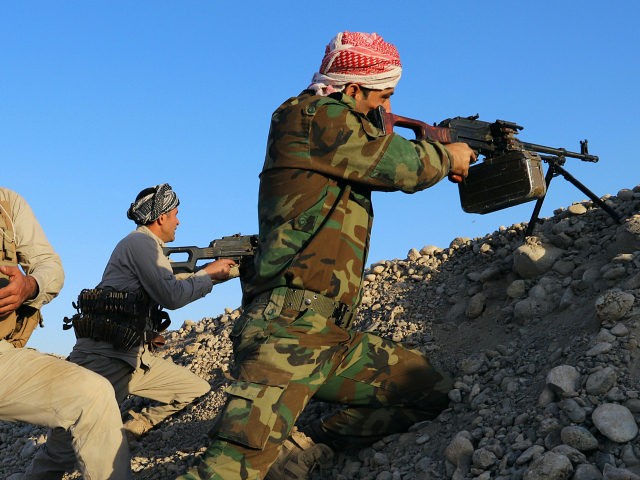Reports on Friday morning indicated that the Iraqi Kurdish Peshmerga had reached a ceasefire agreement with the Iraqi military, which began an invasion into Kurdish territory following September’s independence referendum in Kurdistan.
The spokesman for the U.S. Global Coalition against the Islamic State, Colonel Ryan Dillon, had initially told the Kurdish news outlet Rudaw that the two sides had a ceasefire agreement, but later apologized and retracted the statement. Instead, he said on Twitter, dialogue had begun in anticipation of a ceasefire, with no official announcement:
2/2 Both parties talking w/ one another, but not an official “ceasefire.” @CJTFOIR encouraging dialogue w/o further conflict.
— OIR Spokesman (@OIRSpox) October 27, 2017
“We certainly want that to extend, to not be just a ceasefire for a short period of time, but that it extends and there is no more fighting,” Dillon told Rudaw. “So we are encouraging is dialogue, and to trying to get the right people through our contacts from both Peshmerga and the Iraqi security forces. So that something could be worked out diplomatically, and through dialogue, as opposed to fighting.”
Another Kurdish outlet, Kurdistan24, also reported that the two sides reached a ceasefire agreement on Friday. Kurdistan24 cites an unnamed “spokesperson for the coalition” who spoke to Reuters; it is unclear if this, too, was Dillon or another spokesman.
The reports follow a tumultuous 24-hour period in which the Kurds offered to “freeze” the results of the independence referendum in exchange for an end to military operations pitting Baghdad and Erbil against each other. The Iraqi government rejected the offer, with Prime Minister Haider al-Abadi stating that Iraq would “accept only the canceling of the referendum and following the constitution.”
It remains unclear whether any ceasefire in between Erbil and Baghdad would also include an cessation of hostilities on the part of the Popular Mobilization Units (PMU/PMF), a group of Shiite paramilitary fighters who have received weapons from the United States but are largely loyal to Iran (Dillon emphasized that U.S. weapons have not gone to “some elements” of the PMU). The PMU are legally a part of the Iraqi armed forces, but evidence suggests Prime Minister Haider al-Abadi has little control over their operations on the ground.
Rudaw notes that at least one Shiite leader told BBC that the groups were involved in “political negotiations,” suggesting they would also participate in a ceasefire. The PMU are a coalition of militias, however, not all of whom are Shiite or answer to the same commander.
On Thursday, the Kurdistan Regional Government (KRG) once again called for the Iraqi military to leave their territory:
It has destabilized some of the country’s safest areas, displaced over 150,000 individuals and created dangerous security vacuums.
— KR Security Council (@KRSCPress) October 26, 2017
Kurdish outlets have also accused the PMU of a variety of human rights violations, including attacks on and forced displacement of civilians, attempts at ethnic cleansing in Kurdish areas, and, most recently, the recruitment of child soldiers.
The Iraqi military and its PMU wing launched an attack on the disputed territory of Kirkuk this month in response to the execution of a non-binding referendum in the KRG asking citizens if they supported independence. Kirkuk is a multi-ethnic city that had fallen to Kurdish control in 2014 after the Iraqi army, facing an ISIS attack, fled.
Despite the KRG’s longstanding alliance with the United States, the Trump administration opposed the Kurdish referendum and has not stepped in to support the Peshmerga. Kurdish officials have accused the United States of allowing an Iranian invasion to occur in Iraq through the PMU. Hezbollah, whose officials have referred to the invasion as “our victory,” appear to agree.
The State Department has previously claimed that it had no evidence of an Iranian role in the invasion, but Secretary of State Rex Tillerson has since told the PMU to “go home” and leave Iraq.

COMMENTS
Please let us know if you're having issues with commenting.